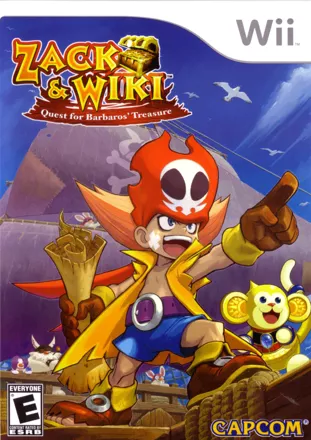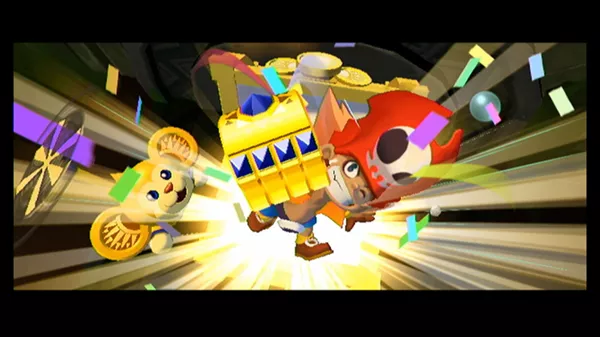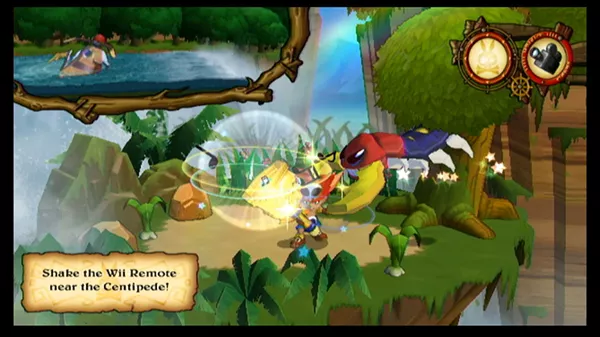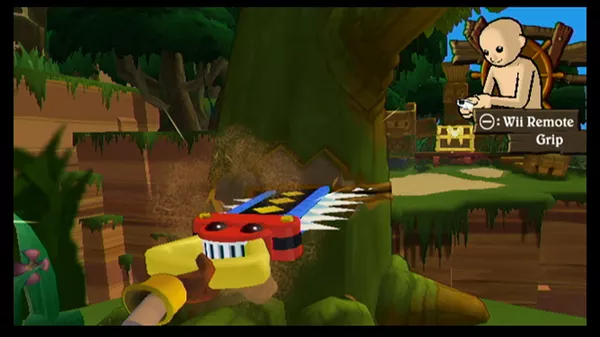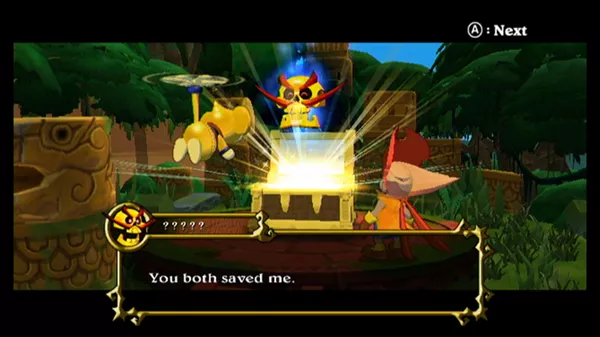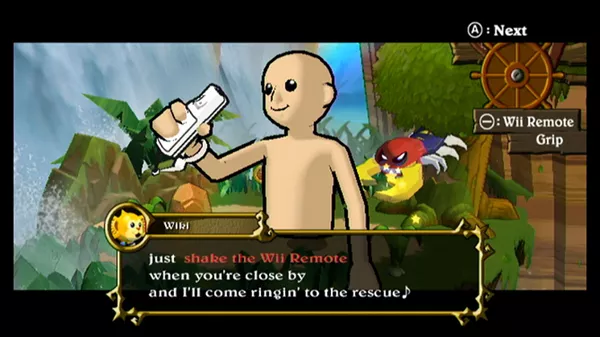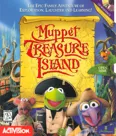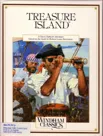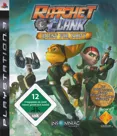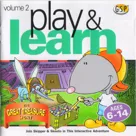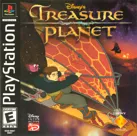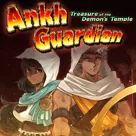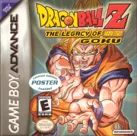Zack & Wiki: Quest for Barbaros' Treasure
Description official descriptions
Zack is a new pirate on a quest to become the greatest pirate ever. In this puzzle adventure game he and his magical monkey sidekick search for treasure as they help the skeleton of the legendary pirate Barbaros.
Zack & Wiki: Quest for Barbaros' Treasure is presented as a series of stages where the player directs Zack to perform a number of actions to let him collect the treasure. The player must deduce what actions will have the desired effect without triggering traps or attracting the attention of the enemies. Using most of the tools causes the game to switch to a first-person point of view, and the player is expected to hold and manipulate the Wii remote as if it were the item on the screen.
Spellings
- 宝島Z バルバロスの秘宝 - Japanese spelling
Groups +
Promos
Credits (Wii version)
191 People · View all
| Director | |
| Art Director | |
| Lead Designer | |
| Scenario Writer | |
| System Planners | |
| Area Planners | |
| Hideout Planners | |
| Lead Programmer | |
| Programmers | |
| [ full credits ] | |
Reviews
Critics
Average score: 85% (based on 87 ratings)
Players
Average score: 3.8 out of 5 (based on 20 ratings with 2 reviews)
The Good
Zack & Wiki is a great game. It's fun to play. And thanks to an segmented design, has made the infamous Point & Click puzzles of the past, accessible to those who just want to sit down for 15 minutes.
Whilst the game makers, and professional reviewers would have you believe that the puzzles are difficult, you can basically put them into two categories: The Logical, and the Insta-Kill.
The logical puzzles I didn't find too hard. As a Software Developer by trade, if help to be good at problem solving. They weren't difficult but they were very enjoyable, and even made me chuckle from time to time at the outcome. A younger audience may have a more challenging time. There were even some levels featuring multiple ways to solve a problem, if only to gain more HQ points.
The way you solve each level requires use of different tools scattered about. Some tools are actually animals, that can be defeated (and turned into a tool) by shaking your flying monkey companion, Wiki. He'll turn into a bell, in case you're wondering, which also banishes demons.
Each action requires a gesture from the Wiimote. You'll be sawing, throwing, hitting, filling, pouring, rocking, turning, and all manner of actions to get stuff done. It's fun, but it would have been nice if the game let you figure out what needs to be done.
The graphics are very nice, bright, colourful. And likewis the sound and music. The whole game seems a celebration of Point & Click adventures. You get HQ points every time you solve a puzzle, or use a particular item; your score bettered if you perform it perfectly, first time. It's fun watching your bunny pirate crew dance on screen with banners and confetti! It's not just crazy, it's over the top Japanese crazy - and I love it!
There are a few secrets to find, such as Tokens in the shape of old Capcom game sprites. And the best secret is finding the music maestro of Barbaros' crew. He's a skull on the floor in some levels, and waking him up by shaking the monkey, activates a rhythm game. Essentially his ruff turns into a record; you must use your Wiimote as you would a bell and shake at the right times. The music is from Capcom's old games (I actually squealed in delight when I heard the infamous Ghost & Goblins theme). This adds a nice distraction, some are more difficult that others, but really is addictive!
The Bad
As mentioned in The Good, There are two kinds of puzzles in this game. Now for the Insta-Kills.
The Insta-Kill puzzles, were just that: Step too far close to something = Death. Pick up something = Death. Get the order wrong in solving puzzles = Restart Level. Go through the wrong door = Beaten up, restart the level. It wasn't that they were frustrating, it's that they are the complete opposite of the logical puzzles: Trial and Error.
I was expecting a challenging game focused on logical solutions; like a Sudoku: difficult, but solvable. The Insta-Kills grow in frequency, and it tends to be the hardest rated levels that contain the most. It's sad that this quantifies the difficultly. These kinds of puzzles may put off the younger audience its visuals seem to appeal to.
There are ways around these kinds of puzzles: Tickets to take you back in time seconds before you did what you did to get killed, and Dolls that you can trade in for tips. Using either will lower your score for the level, and new ones cost increasingly more - so it's often better to start the level from scratch. Of course, neither Tickets or Dolls would be necessary, had there been no illogical puzzles.
There's not much of a story, but enough to see how it all turns out. I would have preferred something more in depth, but it doesn't exactly spoil the fun, or atmosphere.
One annoying design feature, mentioned in The Good, was that even though you may be half way through the game, or have used every tool or object, and have basically mastered any Wiimote gesture you'll need, the game still shows you how you should hold the damn controller. It's bad enough having a rather large diagram in the top-right of the screen, but the flow of the game is also interrupted with a larger version of said diagram before. every. action.
Even if you've already done it several times that same level. It's not ruinous, just annoying, and I would have preferred an option in the menu to disable any help, and let me figure out how to use something. There's only so many ways you can use a hammer, or a saw!
The Bottom Line
A fantastic game, by any ones standards. It's sad that the only bad points stem from a lack of courage to make it more than it is.
-
The Puzzles are great, but in places just lazy (Insta-Kills).
-
The Wiimote is put to good use, but the game makes sure you know how to use it each, and every time.
-
The visuals are charming and fun, but are bound to put off a more hard-core audience.
-
The levels are a good way to get the casual gamer involved, but a more serious Point & Clicker, may not appreciate such disjointed play.
Make of that what you will. This game isn't sure who it's target audience is, but all ages will get loads of fun from it.
Wii · by Heathen Gray (17) · 2008
The Good
The early years of the Wii, from 2006 through 2008 was by far the console’s most experimental period. Now that the console was a smash hit with a mass audience, many of the major developers were willing to take chances with the Wii, creating games with the console’s innovative controller in mind that simply couldn’t be done on the competing systems. This period was when the limitations of the Wii Remote were really tested, but it’s also where the Wii, and motion controls in general, began to receive their negative reputation. For every game that seemed to get the motion controls right, there were at least five others that got them either broken or barely playable. As this period drew to a close, developers, and the public, slowly began to realize that games could only go so far with the motion controls before they became broken, and as a result of this, developers began simplifying motion controls from their games, or even dropping them altogether.
One of the most championed games during this period was Capcom’s Zack and Wiki: Quest for Barbaros’ Treasure, a point-and-click action-puzzle game with extensive usage of both pointer and motion controls. Though point-and-click games are one of the oldest genres on the computer, they weren’t really possible on consoles until the Wii came along.
Zack and Wiki is pretty much an “arcade” take on the classic point-and-click adventure genre. Rather than have several screens to go through in a non-linear fashion, the game’s progression is confined to a series of single-room stages. The goal of each stage is to collect a treasure chest. Each chest is guarded by a series of interlocked puzzles that Zack has to solve before reaching the chest. For example, he might need to find a way to make a key to open a door with the chest behind it. Or, even more creatively, find a way to create a potion to shrink Zack or make him invisible. The variety of scenarios the designers have come up with is both highly amusing and extremely creative.
When Zack comes across an object he can interact with, or is somehow interested in, the game switches to a first-person view in which the player manipulates the object with Zack’s disembodied hand. You’ll be pulling switches, twisting knobs and keys, pushing buttons, and much more during these sections. Many of these sections allow the player to use the item that Zack is currently carrying in his inventory. These items can be used in ways both obvious and not-so-obvious, and most of the items are only used once or twice for the entire game. These puzzles are more engaging than traditional inventory puzzles, since they not only require you to see that the item should be used with them, but to figure out the exact way in which to use them. This introduction of motion-based puzzle events is Zack and Wiki’s main innovation, and something that is simply not possible on the PC.
In many stages, you will find various animals lying around. When you shake the controller near one of these creatures, Wiki will turn into a magic bell, which transforms, or “itemizes” the creature into an inanimate object necessary for solving the puzzle. For example, Wiki will turn bats into umbrellas, centipedes into saws, and spiders into rackets. The controls for all of these objects mostly work as you would expect, with a few exceptions. Some puzzles actually require you to turn an animal to an item, place it somewhere else, and de-itemize it to win. Wiki’s bell also attracts any nearby coins towards Zack (more on those later).
The graphics are cel-shaded, with an extremely colorful and vibrant look that’s very anime-ish. Sadly, the Wii doesn’t always quite seem up to the task of rendering the visuals, since slowdown is quite frequent during some of the more complex stages. Still, it’s a pleasing-looking game overall. Despite the cute exterior, the game is actually quite challenging, so much so that I felt absolutely no shame in consulting both the in-game hints as well as internet walkthroughs for help during the final stages.
The Bad
It wasn’t that the puzzles were absolutely stumping me, it was the sheer frustration I felt every time Zack died while I was playing. Yes, death is a very real and constant threat in Zack and Wiki, and though the game merely fades to black with a skull-and-crossbones image every time before death actually happens, some of the implied deaths are surprisingly gruesome for such a kid-friendly looking game. Every time you die, you have to restart the entire level all over again. There are zero checkpoints of any kind available to you. Though this isn’t a problem at the start of the game when stages can be solved in about a minute, by the end, when levels can take upwards of ten to fifteen minutes to perfectly solve, having to repeat large sections of gameplay only to make a mistake just before the stage ends really grinded on my patience. As the game wrapped up, I was ready to chuck my Wii remote at the wall. There’s a fine line between challenge and frustration, and Zack and Wiki crosses it far too easily.
The game attempts to alleviate this with Oracle Dolls and Platinum Tickets, and both completely fail for different reasons. Oracle Dolls allow the player to summon a character to give them a hint about the puzzle they are stuck on. The problem is, the player has no control over whether the hint given will actually help them with the puzzle, or be something they had already figured out. Platinum Tickets act as extra lives, allowing the player to revive Zack just before a fatal mistake occurs. The problem with Platinum Tickets, which also extends to Oracle Dolls, is their price. Revivals and hints do NOT come cheap in Zack and Wiki, and the more of them you buy (and subsequently waste), the more expensive they become, so unless you’re a point-and-click genius with the patience of a monk, chances are by game’s end that you’ll have to restart very long levels entirely and search for walkthroughs on the internet, because these supposedly helpful items will be too expensive to actually buy.
It wouldn’t be so bad if you could earn money at a reasonably fast rate, but you can only earn just a few coins in each level by searching in rocks and pots. Each time you look under one of these, the amount is completely random as to how much you’ll actually get each time. Also, despite the fact that Zack is a pirate and is constantly collecting treasure, there’s no way to actually sell any of that treasure to bolster your wallet so that you can actually buy tickets and dolls. This means that you might actually have to replay levels just to get enough money so you can get the next ticket or doll to “help” you with the level you are actually stuck on. To make matters worse,when collecting coins, you have to win the level they are on as well, otherwise, they are lost. In the second-to-last level of the game, the player earns a decent amount of money since there are lots of coins in it. The biggest insult comes during the final level. Since I had gotten so much money from the penultimate level, I bought a bunch of tickets and dolls to use on what was sure to be a very long and frustrating final stage, only to find out that the very last stage does NOT let you use any of these items. I was finally able to purchase a decent amount of these items only to have the game slap me in the face and tell me that I couldn’t use them. This is, quite simply, cheap and unfair game design, and it’s unbelievable that this actually passed into the final product.
Though many of the contraptions and items in Zack and Wiki work far better that you could reasonably expect for such an early Wii title, there were a couple of them that were pretty much broken. The racket requires pin-point timing and precision to hit a fireball into necessary targets. You can’t simply swing the racket and have the ball go where it needs to, you have to actually hit it with both the right time, and with the right amount of strength, as well. This is very annoying, since many of the previous puzzles only required very simple motions and thinking. The same goes for the sword, which you use to fight an undead skeleton. It just plain doesn’t work at all, and requires a level of reflexes that the game otherwise never demands of the player. It’s actually easier to win the sword fight by just flailing around since the controls are so amazingly bad. These two puzzles, both of which occurred in the final stages, only added to the frustration I felt as I reached the end of the game.
Finally, the game trades in a major element of the point-and-click genre in its rigid arcade design: story. The story is typically an important element of these games, since the plot is what makes such games addictive and compelling for the player. The story in Zack and Wiki is largely thin and uninvolving, concerning the adventures of Zack and Wiki as they collect the treasure while battling rival pirates, finding a legendary ship, and eventually saving the world. The story is quite bland and cartoonish, despite ending on a poignant, ambiguous, and utterly unexpected note. It ultimately ends up taking a backseat to the gameplay, which was just engaging enough to make me play through despite the extreme levels of frustration I felt while playing.
The Bottom Line
I don’t quite know exactly how to feel about Zack and Wiki. Though it may have been one of the Wii’s most original and creative games back in 2007, it’s been surpassed since then in nearly all of its strong areas by other titles that have come along since then, and today is far more frustrating than fun. The game starts off on a very strong foundation, only to fall apart by the end due to unfair design choices and extremely long stages. Zack and Wiki had its day in the sun, but I don’t really think it’s that amazing of a game today.
Wii · by krisko6 (814) · 2012
Discussion
| Subject | By | Date |
|---|---|---|
| Company logo | Freeman (65099) | Sep 6, 2019 |
Trivia
1001 Video Games
Zack & Wiki: Quest for Barbaros' Treasure appears in the book 1001 Video Games You Must Play Before You Die by General Editor Tony Mott.
Controversy
In one of the promotional videos for the game, one of the sounds heard after completing a task was the Islamic prayer Allahu akbar, which translates to "God is great". Capcom received a complaint from The Council on American-Islamic Relations and removed the phrase from the final version.
Awards
- GameSpy
- 2007 – #6 Wii Game of the Year
- 2007 – Wii Adventure of the Year
Analytics
Upgrade to MobyPro to view research rankings!
Related Sites +
-
Wikipedia: Zack & Wiki: Quest for Barbaros' Treasure
Article in the open encyclopedia -
Zack & Wiki: Quest for Barbaros' Treasure
Official game website -
Zack & Wiki: Quest for Barbaros' Treasure
Overview of the game at Nintendo.com.
Identifiers +
Contribute
Are you familiar with this game? Help document and preserve this entry in video game history! If your contribution is approved, you will earn points and be credited as a contributor.
Contributors to this Entry
Game added by Sandy McArthur.
Wii U added by Michael Cassidy.
Additional contributors: Jeanne, Sciere, Alaka, Ben K, Wizo, samsam12, Patrick Bregger, sgtcook, FatherJack, Flapco.
Game added November 3, 2007. Last modified June 18, 2023.
